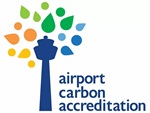Environmental initiatives at the airport
Climate change is predicted to have long-term consequences for our economy, our environment, and public health and safety. To do its part to reduce the threat, King County International Airport-Boeing Field aims to be carbon neutral by 2030 for Scope 1 emissions (direct emissions controlled by KCIA) and Scope 2 emissions (indirect emissions from purchased electricity, heating, and cooling in buildings). These actions help us prepare for climate change and support King County's Strategic Climate Action Plan.
Airport Carbon Accreditation Program

KCIA has achieved has achieved Level 3 in the Airport Carbon Accreditation Program (ACAP) by engaging airport tenants and users in reducing their carbon emissions.
In 2021, KCIA was the first general aviation airport in Washington state to join the effort and achieve ACAP Level 1. Then KCIA achieved Level 2, demonstrating actual reductions in greenhouse gas emissions. ACAP is the only airport-specific, internationally recognized carbon management standard. Through its six levels of accreditation, ACAP can be used by any airport to manage its environmental impact, and each level reached increases an airport's ability to mitigate the effects of climate change. There are slightly more than 100 airports in North America, and just more than 600 worldwide, that are engaged in ACAP.
IATA Environmental Assessment Program

KCIA is also the first airport in the U.S. to begin the IATA Environmental Assessment (IEnvA) program, a new international certification program that helps airports and other air transport industry stakeholders towards greater environmental sustainability. Based on globally recognized standards and industry best practices, including the ISO environmental management system standard and the IATA Operational Safety Audit (IOSA), IEnvA is a voluntary, subscription-based, turnkey solution for environmental management.
Other efforts
The airport has demonstrated its commitment to environmental stewardship and sustainability in other ways as well. For example, KCIA purchased a battery-electric runway sweeper, the first airport in the nation to deploy one of these zero-emissions vehicles. In addition, KCIA is also first in the nation to take delivery of a hybrid electric airport fire engine. The new Striker Volterra 6x6 Aircraft Rescue and Firefighting (ARFF) vehicle replaced the airport's oldest diesel-only fire truck. Over the next few years, the airport will continue to electrify more of its ground vehicle fleet.
Capital construction projects are also part of the airport's environmental sustainability efforts, meeting or exceeding King County standards for construction and demolition debris landfill diversion rates.
KCIA is being assisted in its environmental work by WSP, an internationally recognized, locally dedicated engineering firm that has helped airports of all sizes in planning and design for a more equitable, environmentally sustainable future. WSP and the airport worked together to develop a ten-year work program to achieve carbon neutrality and establish annual carbon footprint reporting. Our 2021 carbon footprint calculations show a 44% total emissions reduction at KCIA compared to 2007.
Air Monitor Program
In addition to our efforts to track and reduce greenhouse gas emissions, KCIA also has Purple Air Monitors that display live reports of air quality in the neighborhood surrounding the airfield. These sensors monitor small particulates in the atmosphere that may have an impact on health.
Dashboard
This live dashboard summarizes the progress our team has made towards increasing the amount of construction waste diverted away from landfills during airport construction, maintenance, and upkeep projects associated with our Capital Improvement Program.
 Translate
Translate